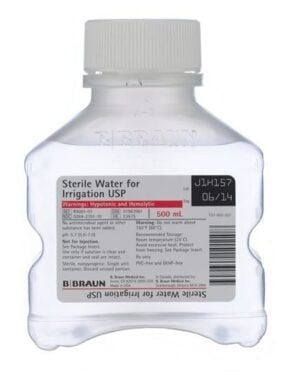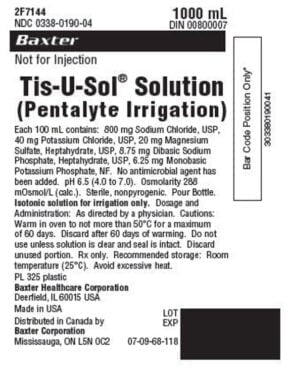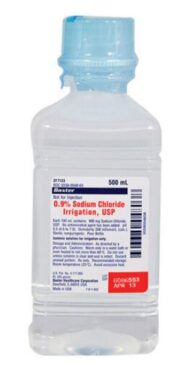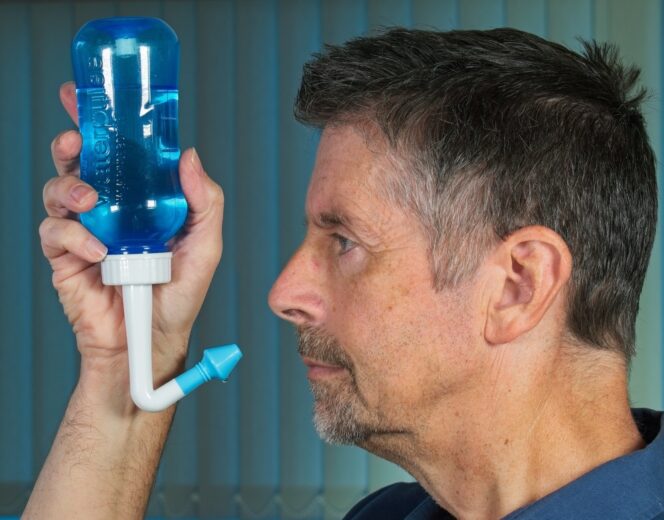During or after conducting surgery, it is of paramount significance that the wounded area should be washed frequently to prevent any buildup which may cause pain to the patient or, in the worst-case scenario, result in an infection that can further penetrate the body via the bloodstream. Keeping in mind the importance of intraoperative and postoperative wound cleaning, irrigation solutions are formulated according to the guidelines of USP (United States Pharmacopoeia) and NF (National Formulary) and are used in hospital setups frequently. Let us take a look at the basic composition of these irrigation solutions and discuss some of the commonly used irrigation solutions which are also available online on Health Supply 770.
What are irrigation solutions?
Irrigation solutions are isotonic fluids that are intended to be used intra-operatively or post-operatively for the purpose of cleaning the incised or wounded area.

These solutions should be:
- Clear to the naked eye
- Isotonic i.e. having the same tonicity as that of the blood
- Biocompatible
- Non-reactive as well as non-irritant to the body
- Little to no toxicity
Applications of an irrigation solution
The irrigation solutions can be used in the following conditions:
- Nasal irrigation is a common use of these solutions which helps the patient breathe properly by washing out the excessive mucus as well as other nasal irritants such as pollen grains, dust, bacteria, or other pollutants.
- These solutions come in handy for intra-operative cleaning during laparoscopic surgery.
- Transurethral resection surgery of the prostate also utilizes irrigation solutions for washing the area being operated on.
- These are also important for orthopedic surgeries.
- Microvascular surgeries also employ irrigation solutions.
- Thrombosis can be prevented by the use of a heparin-infused irrigation solution.
General composition of irrigation solutions
Irrigation solutions are composed of a wide variety of chemical moieties which may vary in nature as well as concentration according to the manufacturer. These include:
Sodium chloride
An aqueous solution of sodium chloride (NaCl) in a concentration of 0.9% as standardized by the United States Pharmacopoeia (USP) is frequently used in medical practice due to its isotonicity to the blood. Prior to use, it is sterilized to make sure the absence of any pyrogenic entity. The solution has the following properties:
- 900 mg of NaCl per 100 ml of the solution
- An isotonicity of 308 mOsmol/liter
- An electrolyte content of 154 mEq/liter
The solution is free from anti-bacterial components as well as added buffering agents.
Potassium chloride
Potassium chloride or KCl is a white, crystalline, granular substance with no odor. It has a saline taste. It is added to purified water to generate irrigation solutions.
Apart from these two frequently used salts, the following are also included in an irrigation solution:
- Magnesium sulfate
- Monobasic potassium phosphate
- Dibasic potassium phosphate
These irrigation solutions, as are marketed into a plastic bag, may contain a smaller concentration of diethyl hexyl phthalate (DEHP) as well as polyvinyl chloride (PVC) which are the major components of plastics.
Here are some of the commonly used irrigation solutions:
1. Baxter Tis-U-Sol (Pentalyte Irrigation)
Tis-U-Sol, formulated by Baxter International Inc., is a sterile, non-pyrogenic irrigation solution.

Label of the Tis-U-Sol solution
Composition of Baxter Tis-U-Sol (Pentalyte Solution)
Each 100 ml of the Tis-U-Sol is based on the following components:
- 800 mg Sodium chloride (NaCl), USP
- 40 mg Potassium chloride (KCl), USP
- 20 mg Magnesium sulfate (heptahydrate), USP
- 75 mg Dibasic sodium phosphate (heptahydrate), USP
- 25 mg Monobasic potassium phosphate, NF (i.e. National Formulary)
Specifications of Baxter Tis-U-Sol (Pentalyte Irrigation)
The Baxter Tis-U-Sol (Pentalyte Irrigation) has the following characteristics:
- The Tis-U-Sol irrigation solution is sterile.
- The solution is completely pyrogen-free.
- The solution is isotonic to the blood.
- The Tis-U-Sol solution has a pH ranging between 4.0 to 7.0, 6.5 on average.
- It has an osmolarity of 288 mOsmol/L.
- It is dispensed in 1000 ml pour bottles.
2. Baxter Sodium Chloride Irrigation Solution
Baxter sodium chloride solution is a topical, sterile, non-pyrogenic, as well as isotonic irrigation solution.

Baxter Sodium Chloride Irrigation Solution
Composition of Baxter Sodium Chloride Irrigation Solution
It has 0.9% NaCl which can be employed for the following purposes:
- For washing and cleaning the wound
- For flushing the wounds or skin abrasions
- For opening the blocked sinuses
- For the relief of dehydration
Specifications of the Baxter Sodium Chloride Irrigation Solution
The Baxter sodium chloride irrigation solution has the following characteristics:
- There is an absence of any colored substance in the Baxter NaCl solution.
- There is an absence of any kind of odor.
- The pH of the Baxter sodium chloride solution ranges between 4.5 to 7.
- The solution is dispensed into a 500 ml container.
Precautionary measures
While using irrigation solutions, the following considerations must be kept in mind:
- The irrigation solution should be checked visually before use. It must appear clear to the naked eye. If not, discard.
- The seal of the bottle containing the irrigation solution must be intact.
- Irrigation solutions can be warmed prior to their employees up to 50°C up to 60 days. After 60 days, the solution must be discarded.
- Unused portions must not be stored for future use.
- Irrigation solutions are only intended to be used topically. Therefore, these must not be administered intravenously.
Conclusion
The use of irrigation solutions is crucial while a physician is dealing with a surgical wound or blocked airway passage, among other conditions both intra-operatively and post-operatively. These irrigation solutions are easy to use, sterile in nature, completely non-pyrogenic, and isotonic to the bloodstream. These characteristics have rendered them safe enough to be used on a daily basis. Hence, irrigation solutions are one of the most essential items in a hospital.

PhD Scholar (Pharmaceutics), MPhil (Pharmaceutics), Pharm D, B. Sc.
Uzma Zafar is a dedicated and highly motivated pharmaceutical professional currently pursuing her PhD in Pharmaceutics at the Punjab University College of Pharmacy, University of the Punjab. With a comprehensive academic and research background, Uzma has consistently excelled in her studies, securing first division throughout her educational journey.
Uzma’s passion for the pharmaceutical field is evident from her active engagement during her Doctor of Pharmacy (Pharm.D) program, where she not only mastered industrial techniques and clinical case studies but also delved into marketing strategies and management skills.
Throughout her career, Uzma has actively contributed to the pharmaceutical sciences, with specific research on suspension formulation and Hepatitis C risk factors and side effects. Additionally, Uzma has lent her expertise to review and fact-check articles for the Health Supply 770 blog, ensuring the accuracy and reliability of the information presented.
As she continues her PhD, expected to complete in 2025, Uzma is eager to contribute further to the field by combining her deep knowledge of pharmaceutics with real-world applications to meet global professional standards and challenges.








